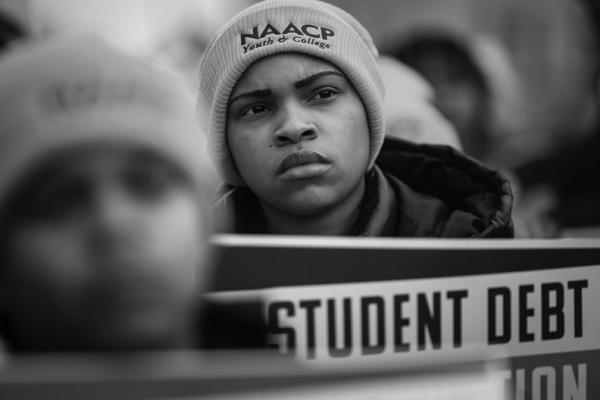Supreme Court strikes down Biden’s plan to forgive millions of student loans
WASHINGTON — The Supreme Court on Friday rejected President Biden’s plan to forgive millions of student loans, ruling the nation’s chief executive did not have legal authority to waive more than $400 billion owed to the government.
The Biden administration had asserted its right to cancel the loans as part of its emergency response to the COVID-19 pandemic and under a 2003 law called the HEROES Act, passed at the time of the Iraq War.
By a 6-to-3 vote in Biden vs. Nebraska, the court’s conservatives said that only Congress could authorize such a large- scale cancellation of government-provided loans, and it had not done so.
Writing for the majority, Chief Justice John G. Roberts Jr. said, “The HEROES Act allows the secretary to ‘waive or modify’ existing statutory or regulatory provisions applicable to financial assistance programs under the Education Act, but does not allow the secretary to rewrite that statute to the extent of canceling $430 billion of student loan principal.”
In dissent, Justice Elena Kagan wrote: “In every respect, the court today exceeds its proper, limited role in our nation’s governance..... The result here is that the court substitutes itself for Congress and the executive branch in making national policy about student- loan forgiveness.”
A White House official said Friday that Biden disagreed with the court’s decision and would have more to say later in the day.
The heavy burden of student loans had become a major issue for Democrats.
As a candidate in 2020, Biden promised to forgive up to $10,000 in student loans for many young borrowers, but he did not seek legislation from Congress when it was under Democratic control.
Last year, with the end of pandemic in sight, he joined Education Secretary Miguel Cardona to announce the government — as part of its COVID-19 response — would forgive $10,000 of most outstanding student loans and up to $20,000 for those who came from low-income families About 26 million borrowers applied for relief.
But the policy’s legal status remained in doubt. The 2003 HEROES Act said the Education Department could “waive or modify” any provision of the government-funded student loans for any borrower affected by “a war or other military operation or national emergency.”
Lawmakers said their aim was to extend temporary relief to those who were called up to serve in Iraq and to make sure they were not “in a worse position financially” because of their service.
In March 2020, President Trump declared a national emergency in response to COVID-19, and his administration suspended the required repayments and the accrued interest on outstanding students loans. These suspensions have remained in effect and have cost the government more than $100 billion.
Deciding to go further, Biden said the cost of higher education had skyrocketed and left many students with crushing debts. The White House said his plan to forgive some or all of millions of loans would “provide more breathing room to America’s working families as they continue to recover from the strains associated with the COVID-19 pandemic.”
But attorneys for Nebraska and five other Republicanled states sued and argued the president was “unlawfully invoking the COVID-19 pandemic to assert power beyond anything Congress could have conceived.”
In defense of the plan, the administration’s lawyers said Congress had indeed authorized the Education Department to “waive or modify” any provision of the student aid programs. They also argued the states had no standing to sue because they were not harmed by the president’s decision to forgive loans.
But a federal appeals court in St. Louis sided with the Republican-led states and blocked the loan cancellation program from taking effect. In December, the Supreme Court refused to lift that order and agreed to hear the administration’s appeal in late February.
Led by Roberts, the court’s conservatives said they were highly skeptical of the notion that the 2003 law or the pandemic gave the administration authority to wipe away millions of loans.
Times staff writer Courtney Subramanian in Washington contributed to this report.

